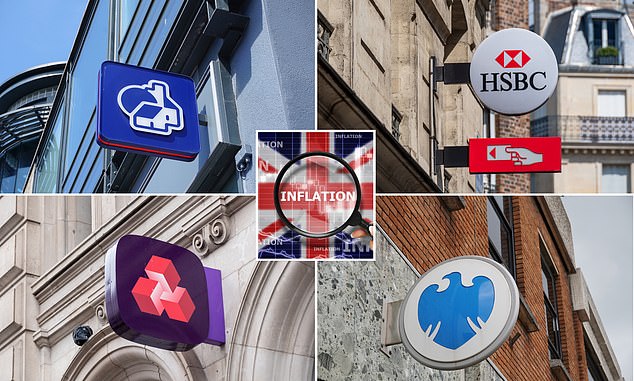Table of Contents
- Inflation rose to 2.2 percent in the 12 months through July, up from 2 percent in June.
Lenders’ tendency to cut mortgage rates is unlikely to be “altered” by the first rise in inflation this year, experts say.
Inflation rose to 2.2 per cent in the 12 months to July, up from 2 per cent the previous month, ONS figures showed today.
While this meant inflation was back above the Bank of England’s 2 percent target, it was a smaller rise than expected, with markets expecting a 2.3 percent increase.
Mortgage price war: Lenders compete fiercely with each other and send rates as low as 3.83% for five-year fixed mortgages
The Bank of England cut its base rate on August 1, partly thanks to inflation remaining within its 2 percent target for two consecutive months.
In recent weeks, mortgage lenders have been cutting rates in the expectation that interest rates are now on a downward trajectory.
There are currently several lenders offering five-year fixed rates below 4 per cent, including Barclays, NatWest, Nationwide and HSBC.
But with inflation rising again, this has raised some concerns that the Bank of England will delay plans to cut interest rates further.
Ben Perks, managing director of Orchard Financial Advisers, told Newspage: “A base rate cut in September was always unlikely but now looks completely out of the question.
“It is disconcerting to see inflation rising again, but a rebound to 2.2 percent is better than expected.”
Meanwhile, Peter Stimson, head of product at lender MPowered Mortgages, added: ‘With headline inflation back above target, a base rate cut is unlikely to happen in September.
‘However, there is still the possibility of a cut before the end of the year in what remains a very fluid market.’
What will happen to mortgage rates?
The ongoing mortgage rate war has seemed relentless at times. Since the beginning of July, the lowest five-year fixed rate has fallen from 4.28 percent to 3.83 percent and the lowest two-year fixed rate has fallen from 4.68 percent to 4.22 percent.
David Hollingworth, associate director at L&C Mortgages, believes mortgage rates are unlikely to be “disturbed” by rising inflation, largely because such a rise was already expected.
“The direction of travel is unlikely to be altered by the reaction to today’s news and the market will be well prepared for a rally,” Hollingworth said.
‘Instead, we are likely to see continued and frequent movements in mortgage rates, as lenders continue to adjust and improve where they can.’
Mark Harris, chief executive of mortgage brokerage SPF Private Clients, agrees with Hollingworth.
“Given that inflation is rising less than expected, this should not negatively impact the Bank of England’s plan to cut interest rates, with markets pricing in two more rate cuts this year,” Harris said.
‘The first rate cut since the pandemic has been welcomed and sends an important message that rates have peaked and are on a downward trajectory.
“The speed with which these further rate cuts occur will depend on the state of the economy and inflationary pressures.”
MPowered’s Stimson also believes there will be little impact on mortgage rates, although he admits the cuts could stop soon.
“Competition among lenders is the most intense I’ve seen in the last 30 years of working in the industry,” Stimson said.
‘Although inflation has increased, there is unlikely to be an impact on mortgage rates given that this is already priced into prices.
‘Swap rates, which lenders use to price fixed-rate mortgages, fell significantly in the days following this month’s base rate cut and even further after weak nonfarm payrolls data and fears of a U.S. recession.
‘However, swaps have risen over the past week and this should mean that mortgage prices are beginning to stabilise around their current level for the time being.’


